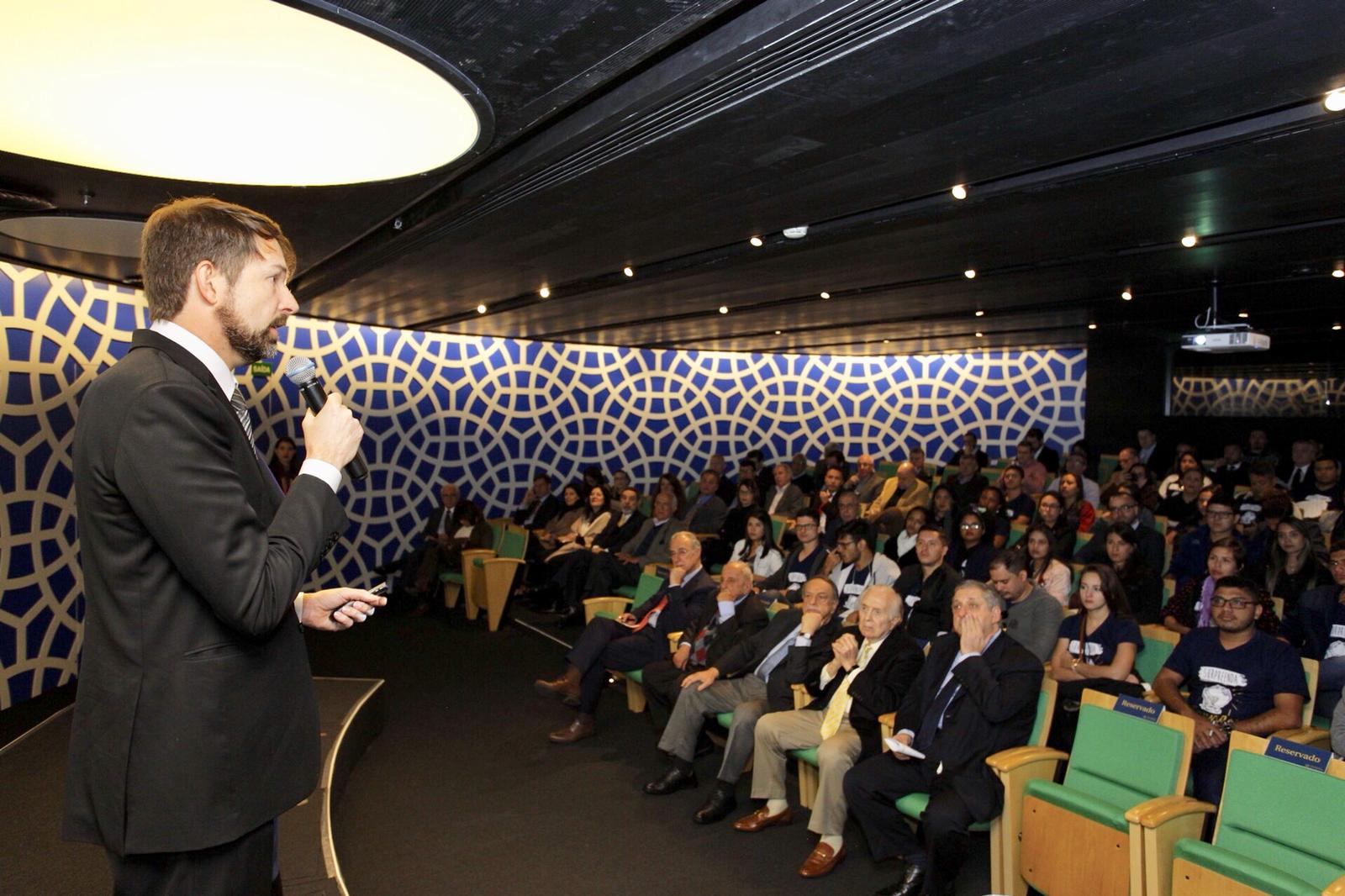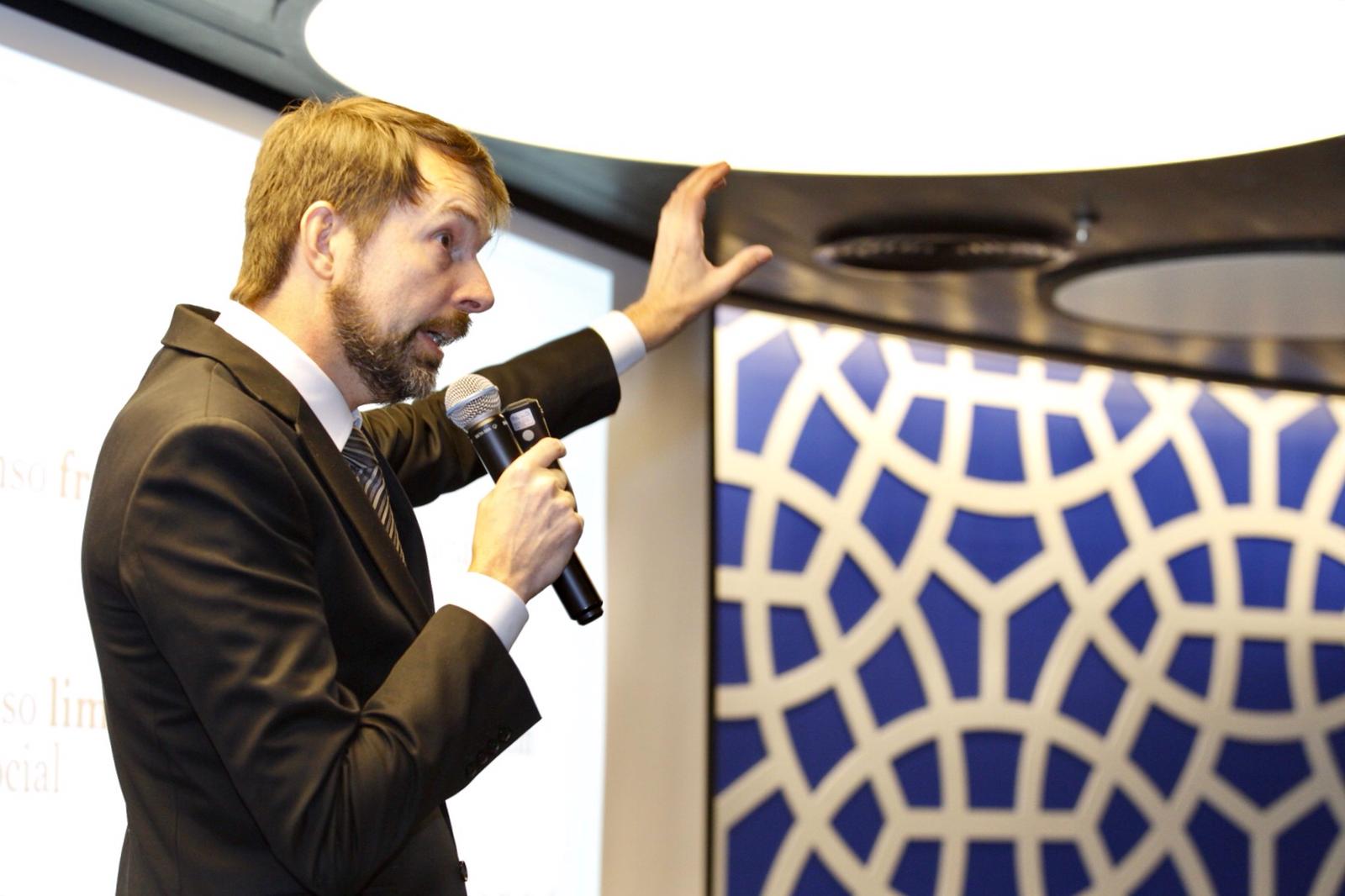São Paulo – Brazil can be characterized as an unstable or a little consensus democracy, according to political scientist Fernando Schüler, who gave the lecture “Brazil: elections, democracy and the challenges for the country in 2019” this Wednesday (15) at Walid Yazigi Auditorium in the Arab Brazilian Chamber of Commerce in São Paulo.
Fernando Schüler offered an overview of Brazil’s presidential election campaign, presenting possible scenarios in the case of a runoff election, and explained the context in which the elections are playing out in the country, in a moment of national political instability and with many more people being active in the political debate.
According to him, democracy has been going through a different moment worldwide. “Democracy is polarized, to a large extent this is going on because of technology. 30 years, 20 years ago you had ten thousand people engaged in the debate, economists, columnists, journalists, politicians. Currently, you see tens of millions of people,” said Schüler.

This type of democracy is louder, more critical and in it citizens have more power, according to the political scientist. “Political parties lost most of its function and today every person has the means to self-represent themselves and to self-organize,” he said, mentioning the online mobilizations for demonstrations at Paulista avenue.
According to Schüler, this new phase came to last. “Democracy won’t ever return to what it was in the past, it will be louder, more unstable, consensus will be harder to achieve,” he said. Schüler says that the difficulty for achieving consensus regarding reforms in Brazil is the tone of democracy. He pointed out that the scenario is made worse by the Brazilian context of political tension due to the impeachment of former president Dilma Rousseff (PT) and the economic crisis.
Schüler mentioned a piece by British magazine The Economist, published before the impeachment, that stated that the overthrow of the president would “poison” Brazilian politics. The political scientist described the impeachment process as an exercise by democracy and by Brazilian institutions but said that it indeed poisoned Brazilian politics even further.
“The impeachment didn’t arrive here by chance, Brazil was already riding a process of ungovernability, of fragmentation of political parties, there was a brutal crisis already, the Brazilian economy had declined 3.8% in 2015, it was in route to a fall that would eventually reach 7% in two years, it wasn’t plucked out of the sky, but it added even more toxins to Brazilian life, and we live in a country of little consensus, what I call an unstable democracy,” he said.
According to Schüler, Brazil sees little consensus in issues that he believed to be solved, such as democratic rules. He mentioned an article written by former president, currently in jail, Luiz Inácio Lula da Silva (PT) in The New York Times, in which he declares that there’s an ongoing coup d’état in the country. “A democracy of little consensus is like this, it has powerful leaders of the political and party system that question and pressure the rules of the game all the time. This happens in the left and in parts of the right, also,” he said.
He mentioned other areas experiencing little consensus in Brazil, such as the need for fiscal responsibility and said that there’s very little consensus on the country’s modernization process. But, according to Schüler, the Brazilian democracy is not at risk. “We are having a moment of unrest, of instability, of discord, of little consensus, and we have to overcome it, and Brazil has the institutions to do it,” said the political scientist.
Elections
After talking about democracy and providing an overview of the current fragmented party system in Brazil, the political scientist showed an election poll conducted by the institute RealTime Big Data. In it, the candidate Jair Bolsonaro (PSC) leads the presidential race with 21%, followed by Marina Silva (Rede), with 11%, and Geraldo Alckmin (PSDB), with 9%.
In a polling where people have to come up with their candidates’ name spontaneously, Luiz Inácio Lula da Silva is the front-runner with 17%, followed by Bolsonaro with 14%, and Ciro Gomes (PDT), with 2%. According to Schüler, the fact that Bolsonaro has similar numbers in both polls shows that his constituents are not undecided.
The political scientist said that the election hasn’t began yet in Brazil and that the pre-elections debate has been taking place only among the higher education group, which accounts for 9.5% of the total and are people that have been experiencing the election via social media. “The people still hasn’t entered the campaign,” he said. According to Schüler, during the pre-campaign only Lula and Bolsonaro show up.
Schüler says that the rest of the population should dive into the campaign with the beginning of the paid TV and radio political ads, from which the candidate Alckmin achieved almost 44% of total air time. “He will have Alckmin in the morning, Alckmin during lunch, Alckmin in the afternoon, Alckmin in the evening, Alckmin stating that he lowered crime rates in São Paulo, that he built Rodoanel,” he joked.

According to the political scientist, candidate Ciro Gomes has been backed into a corner, isolated by the left from one side and without signaling a movement to the center from the other. “Lula, from Curitiba, continues to be a great operator within Brazilian politics,” said Schüler. The scientist mentioned Bolsonaro as a new fact in Brazilian politics, explaining that he wasn’t judging if he’s a good or bad candidate, and placing him as an option for the conservative electorate in Brazil.
Schüler said that Brazilian conservatives usually would, begrudgingly, give their votes to PSDB. “There has always been a significant part of Brazilian society that is morally conservative, we have 30% of an evangelical population, and in their rights, that don’t like to discuss abortion, that have restriction to cultural issues in general, that don’t like gender ideology in schools, and that is valid, I’m not saying that it’s right or wrong. This sector wasn’t represented politically,” he said about Bolsonaro’s constituents.
To the political scientist, the Brazilian election will come to three possibilities: Fernando Haddad (PT), Bolsonaro and Alckmin. He believes that PT will keep Lula as a candidate down to their final resort on September 17. Then, the party will present Haddad as the candidate. Haddad would draw Lula’s votes, according to Schüler. “It could work,” he said.
In a runoff election between Alckmin and Haddad, the votes from Bolsonaro would go to PSDB and in a runoff election between Bolsonaro and Haddad, the Alckmin votes would go to Bolsonaro. According to the political scientist, the question is to where the votes from the left would go in a dispute between Alckmin and Bolsonaro.
Fernando Schüler ended his lecture stating that Brazil has today a stronger civil society, with groups to the left and more conservative ones, and that this is the hope for a Congress overhaul.
The Arab Chamber’s president, Rubens Hannun, opened the event. He said that the lecture was taking place in a special moment, the last day for parties to register their candidates por the presidency of Brazil. At the audience were members of the Arab Chamber’s board, Management students of the Maranhão State University and the general public.
Translated by Sérgio Kakitani




